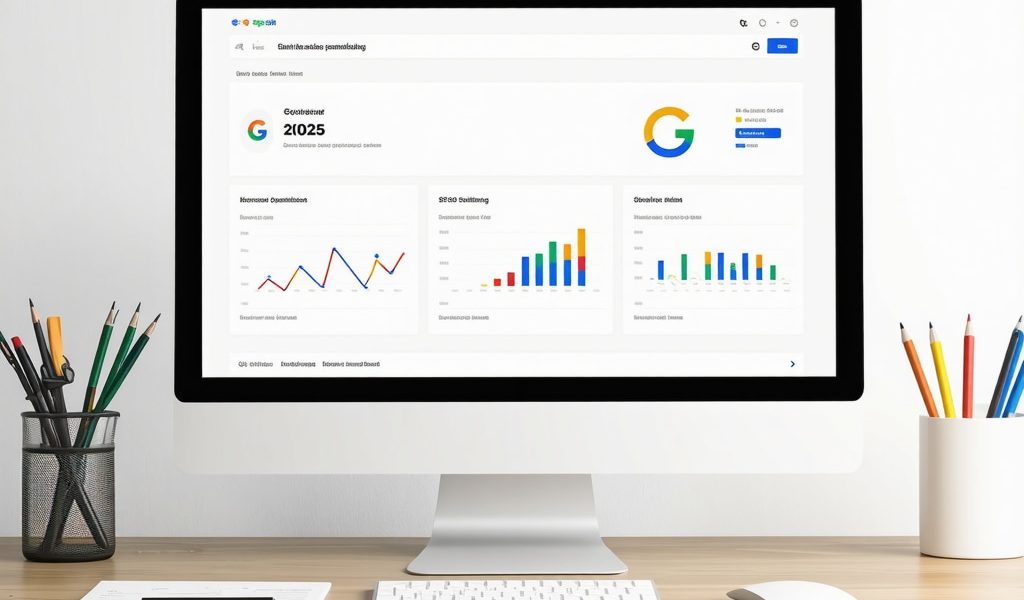Unveiling the Future of Google Business Listings: Strategic Keyword Optimization for 2025
As local searches continue to dominate the digital landscape, mastering the Google Business keyword strategy is no longer optional—it’s essential for businesses aiming to thrive in 2025. Optimizing your Google Business Profile (GBP) requires an expert blend of precise keyword integration, user engagement tactics, and ongoing content updates. In this article, we explore nuanced techniques to elevate your local SEO game, ensuring your listings not only rank but also resonate with your target audience.
Harnessing Semantic Keywords to Elevate Your Google Business Profile
Beyond stuffing primary keywords, the shift toward semantic SEO demands the use of Latent Semantic Indexing (LSI) keywords—terms contextually related to your main keywords. For example, if your core focus is “Google Business Keyword Strategy,” integrating phrases like “local search optimization,” “Google Maps visibility,” and “business listing SEO” enriches your content’s relevance. This strategy aligns with Google’s evolving algorithms that prioritize comprehensiveness and context over mere keyword frequency.
Practically, businesses that embed these semantically connected keywords within descriptions, services, and posts tend to experience a significant boost in local rankings. Such an approach reflects a sophisticated understanding of user intent, a critical factor highlighted by Moz’s analysis on semantic search.
How Can Small Businesses Effectively Implement Keyword Research for Google Business Optimization?
Small businesses often face stiff competition in local markets, making strategic keyword research indispensable. Start by identifying high-intent local keywords using tools like Google Keyword Planner and analyzing competitor profiles. Incorporate these keywords thoughtfully into your Google Business description, services, and posts to enhance discoverability.
For instance, a neighborhood bakery might target keywords such as “artisan bread near me,” “fresh pastries in [city],” or “local bakery delivery.” Regular updates with keyword-rich posts not only signal activity to Google but also engage customers by showcasing new offerings or promotions.
Practical Steps to Optimize Your Google Business Listing for 2025 Success
1. Complete and Consistent NAP Information: Ensure your Name, Address, and Phone number are accurate and uniform across all citations to build trust and improve local rankings.
2. Leverage Google Posts: Use posts to share timely updates, events, and offers, embedding relevant keywords to capture search intent and drive traffic.
3. Optimize Visual Content: Photos and videos with descriptive filenames and alt text containing targeted keywords contribute to enhanced local SEO and user engagement.
4. Engage with Reviews: Responding to reviews with keyword-rich, genuine replies boosts credibility and signals active management to Google’s algorithm.
5. Monitor Performance Metrics: Utilize tools to track views, searches, and customer actions on your profile, enabling data-driven optimization to sharpen your keyword strategy.
Expert Insights: Why Consistent Citation Management Amplifies Your Local Search Authority
One often underestimated aspect of keyword strategy is citation management. Ensuring your business is consistently referenced across authoritative local directories consolidates your online presence, reinforcing your relevancy signals to Google. This consistency directly affects your Google Business ranking by validating your location and services, especially when keywords are harmonized across citations.
For example, a service provider listed uniformly on platforms like Yelp, TripAdvisor, and local chambers of commerce gains amplified trustworthiness, which Google interprets as higher authority.
Elevate Your Strategy with Continuous Learning and Adaptation
Google’s local search algorithms evolve rapidly. Staying ahead means regularly updating your listings and keywords based on performance data and emerging trends. Integrating fresh content weekly, refining keyword targeting, and applying insights from analytics are crucial to maintaining top-tier visibility.
For comprehensive tactics to refine your Google Business SEO, explore this detailed guide that delves deeper into optimization techniques tailored for 2025 and beyond.
Have you experimented with new keyword strategies on your Google Business Profile? Share your experiences below and join the conversation to unlock local SEO success together.
Embracing User Intent: The Heartbeat of Modern Keyword Optimization
Reflecting on my journey optimizing Google Business Profiles, I’ve realized that understanding user intent is the game changer. Keywords alone won’t secure top rankings unless they align with what potential customers are genuinely searching for. For example, when I helped a local fitness studio, we shifted from generic keywords like “gym near me” to intent-driven phrases such as “affordable personal training in [city]” and “early morning yoga classes nearby.” This subtle but powerful pivot brought in more qualified leads who were ready to engage.
Google’s focus on user satisfaction means your keyword strategy must mirror real-world queries, blending informational, navigational, and transactional intents seamlessly. This approach ensures your local SEO efforts resonate authentically with your audience.
Why Regular Content Updates Can Supercharge Your Google Business Profile
One lesson I learned the hard way was the importance of fresh content. Static profiles tend to stagnate. When I started posting weekly updates about new offers, events, and even behind-the-scenes stories, I noticed a consistent uptick in profile views and customer interactions. Google rewards activity and relevancy, so frequent, keyword-rich posts can be a secret weapon.
In fact, a recent study by Search Engine Journal highlights that businesses updating their GBP weekly see up to a 50% increase in local search visibility compared to those who don’t. Integrating targeted keywords into these posts—without sounding robotic—helps maintain that delicate balance between SEO and customer engagement.
What’s the Best Way to Balance Keyword Optimization with Genuine Customer Interaction?
This question often pops up among the businesses I consult. It’s a tricky balance because overly optimized content might feel impersonal, while ignoring keywords can hurt discoverability. My advice is to weave keywords naturally into responses, posts, and descriptions—think of it as storytelling with SEO in mind.
For example, when replying to a review, instead of a generic “Thanks for your feedback,” I would say, “We’re thrilled you enjoyed our organic coffee selection and cozy atmosphere—two things that make our café stand out in [city].” This not only acknowledges the customer but subtly reinforces key search terms.
Tools and Techniques I Rely on to Track and Refine Keyword Performance
Over time, I’ve found that continuous monitoring is essential. Tools like Google Insights and specialized local SEO dashboards provide invaluable data on how keywords perform on your Google Business Profile. Tracking metrics like search queries, customer actions, and photo views reveals what resonates and what needs tweaking.
For those eager to dig deeper, resources such as this detailed guide on GMB performance metrics offer step-by-step advice on leveraging analytics to sharpen your keyword approach and outpace competitors consistently.
What challenges have you faced when trying to balance SEO tactics with authentic customer engagement? Feel free to share your experiences or questions in the comments below—let’s learn and grow together!
Decoding Behavioral Signals: Advanced Metrics to Refine Your Google Business Keyword Strategy
As we delve deeper into the intricacies of Google Business keyword optimization, it’s crucial to move beyond traditional metrics like impressions and clicks. Behavioral signals such as click-through rate (CTR), engagement duration, and action completion rates offer a sophisticated lens to assess how effectively your keywords resonate with your audience. For example, a high CTR paired with low engagement might indicate that while your listing attracts attention, the keyword targeting or content may not fully align with user expectations.
Utilizing tools like Google My Business Insights alongside third-party platforms such as BrightLocal or SEMrush enables granular tracking of these behavioral metrics. This data allows you to iterate keyword choices and content presentation dynamically, optimizing for not just visibility but meaningful user interaction.
Integrating AI-Powered Keyword Research: The Next Frontier for Google Business Profiles
Artificial Intelligence is revolutionizing local SEO keyword strategies by enabling predictive analysis and intent modeling. AI tools can parse vast amounts of local search data to uncover nuanced user intent patterns that traditional keyword tools might overlook. For instance, AI-driven platforms can identify emerging local search trends, seasonal variations, or hyper-specific long-tail keywords that yield higher conversion rates.
Incorporating AI-generated keyword suggestions into your Google Business Profile can diversify your keyword portfolio and deliver a competitive edge. Tools like SEMrush’s Keyword Magic Tool and BrightLocal’s Local Search Rank Tracker integrate AI features designed specifically for local markets, allowing businesses to tailor their profiles with precision.
How Can Businesses Utilize Behavioral Data and AI Synergistically to Enhance Local Keyword Targeting?
Combining behavioral analytics with AI-powered insights creates a feedback loop that fine-tunes keyword strategies iteratively. Start by analyzing user interactions with your Google Business Profile to identify underperforming keywords or content gaps. Then, leverage AI tools to generate new keyword ideas that align with observed user behavior and emerging search trends.
For example, if behavioral data reveals users frequently searching for “weekend brunch near me” but your profile lacks this keyword, AI can help identify related phrases such as “best Sunday brunch in [city]” or “family-friendly brunch spots.” Integrating these into your profile content and posts can capture latent demand and improve local ranking.
Understanding the Impact of Voice Search on Google Business Keyword Strategy
With the proliferation of voice-activated assistants, optimizing for voice search queries has become imperative. Voice searches tend to be more conversational and question-based, often incorporating natural language and local intent. Therefore, your keyword strategy must adapt by including long-tail keywords and question phrases that mimic how people speak.
For instance, instead of targeting “coffee shop [city],” incorporating phrases like “where can I find the best coffee shop near me?” or “coffee shops open late in [neighborhood]” aligns your profile with voice search patterns. Embedding FAQs and natural language responses in your Google Business Posts or Q&A section can further enhance voice search visibility.
Elevating Your Google Business Profile with Structured Data Markup
Implementing structured data markup on your website and linking it to your Google Business Profile enriches the way search engines interpret your business information. Schema.org vocabulary, particularly the LocalBusiness schema, allows you to specify details such as business hours, services, reviews, and location with precision. This semantic clarity boosts your profile’s eligibility for rich snippets and improved local search appearances.
According to Google’s official documentation, correct use of structured data enhances search result presentation and can increase click-through rates significantly. Ensuring your keyword-rich content is semantically annotated harmonizes with Google’s algorithmic preferences for context and relevance.
Ready to elevate your Google Business Profile with cutting-edge keyword strategies? Dive deeper into behavioral analytics and AI integrations by exploring our expert resources and stay ahead in the local SEO game.
Decoding User Engagement: Beyond Traditional Keyword Metrics
To truly excel in Google Business Profile optimization, one must delve into nuanced behavioral metrics that reveal the quality of user interactions. Traditional indicators such as impressions and clicks offer limited insights; instead, metrics like bounce rate, average engagement time, and conversion actions provide a deeper understanding of how visitors are interacting with your profile. These advanced indicators enable businesses to identify keyword relevance gaps and refine content messaging to better meet visitor expectations.
How Can Behavioral Analytics Transform Keyword Strategy for Google Business Profiles?
Behavioral analytics empower businesses to tailor their keyword strategies by analyzing real user interactions. For instance, if data reveals that users frequently search for “24/7 emergency plumbing in [city]” but your profile lacks this specificity, integrating such intent-driven keywords can significantly increase qualified traffic. By continually monitoring engagement patterns, businesses can dynamically adjust keywords to capture evolving local demands and user preferences.
Implementing this approach requires sophisticated tools capable of tracking micro-conversions and user flows, enabling proactive optimization rather than reactive adjustments.
Harnessing AI-Driven Insights: Elevating Local SEO to Predictive Precision
The integration of Artificial Intelligence in keyword research transcends traditional methods by providing predictive analytics that anticipate search trends and user intent shifts. AI leverages machine learning algorithms to analyze vast datasets, uncovering latent semantic relationships and emerging niche keywords that manual research might overlook. This predictive capability equips businesses to preemptively optimize their Google Business Profiles ahead of competitors.
Platforms such as BrightLocal and SEMrush utilize AI to deliver hyper-localized keyword suggestions and performance forecasts, enabling a data-driven, agile SEO strategy that evolves with market dynamics.
Strategic Fusion: Combining Behavioral Data with AI for Optimal Keyword Targeting
The symbiotic use of behavioral data and AI insights facilitates a comprehensive feedback loop, refining keyword targeting with unprecedented precision. Businesses can analyze behavioral trends to identify underperforming keywords and leverage AI recommendations to introduce contextually relevant, high-conversion terms. This iterative process ensures that keyword strategies remain aligned with both current user behavior and anticipated search patterns.
For example, a local restaurant might discover through behavioral analysis that users are increasingly searching for “vegan brunch options in [city]”. AI tools can then suggest related phrases such as “plant-based Sunday brunch near me” or “vegan-friendly cafes open late,” which can be seamlessly integrated into the Google Business Profile content and posts to capture this emerging demand.
Maximizing Voice Search with Conversational Keyword Integration
With voice search becoming increasingly prevalent, optimizing Google Business Profiles for natural language queries is imperative. Voice-activated searches typically feature longer, conversational phrases and question formats. Integrating these long-tail, question-based keywords into your profile’s Q&A section, posts, and descriptions can significantly enhance visibility for voice queries.
For instance, embedding phrases like “What are the best gluten-free bakeries near me?” or “Where can I find late-night pizza delivery in [neighborhood]?” aligns your profile with how consumers vocalize their searches, improving relevance in voice search results and driving higher engagement.
Leveraging Structured Data Markup to Amplify Semantic Clarity
Implementing structured data markup, particularly the LocalBusiness schema from Schema.org, on your website and ensuring it synchronizes with your Google Business Profile enriches the semantic clarity of your business information. This not only facilitates enhanced search result features like rich snippets but also helps search engines understand the contextual relationship between your keywords and business details.
According to Google’s official guidelines, structured data implementation can increase click-through rates by providing users with more informative and attractive search listings. Consequently, including keyword-rich, semantically annotated content positions your business as a prominent and authoritative presence in local search results.
Ready to unlock next-level local SEO performance? Embrace behavioral analytics and AI-powered keyword strategies to transform your Google Business Profile into a dynamic, conversion-driving asset. Explore our expert resources and start optimizing today!
Frequently Asked Questions (FAQ)
What is the most effective way to identify the best keywords for my Google Business Profile?
Effective keyword identification starts with understanding your target audience’s local search behavior. Utilize tools like Google Keyword Planner, SEMrush, and BrightLocal to uncover high-intent, location-specific keywords. Complement this with competitor analysis and behavioral data insights to capture both popular and niche search terms that align with user intent.
How often should I update my Google Business Profile with keyword-rich content?
Regular updates are crucial; aim for at least weekly posts or updates that incorporate relevant keywords naturally. Frequent content signals to Google that your business is active and engaged, which can improve your local ranking and user engagement. Additionally, updating based on emerging trends or seasonal demands keeps your profile relevant.
Can AI tools really improve my local SEO keyword strategy?
Yes, AI tools enhance local SEO by analyzing vast datasets to predict emerging trends, user intent shifts, and uncover long-tail keywords that manual research might miss. Integrating AI-driven insights with behavioral analytics enables a dynamic, data-informed keyword strategy that optimizes both visibility and conversion potential.
How do I balance keyword optimization with authentic customer interactions in reviews and responses?
Balancing SEO with genuine engagement involves weaving keywords naturally into your communication without sounding robotic. For example, when responding to reviews, acknowledge specific customer experiences while subtly reinforcing key search terms related to your services or location. This approach maintains authenticity and boosts keyword relevance simultaneously.
What role do behavioral metrics play in refining my Google Business keyword strategy?
Behavioral metrics such as click-through rates, engagement duration, and conversion actions provide deeper insights into how users interact with your profile. Analyzing these helps identify which keywords resonate and which require adjustment, enabling targeted refinements that enhance user experience and local search performance.
How can I optimize my Google Business Profile for voice search?
Voice search optimization requires incorporating conversational, question-based long-tail keywords that reflect natural speech patterns. Embedding FAQs and natural language phrases in your profile’s descriptions, posts, and Q&A sections aligns your content with how users verbally search, improving visibility in voice-driven queries.
Why is citation management important for local SEO and keyword strategy?
Consistent citation management across authoritative directories validates your business information and strengthens your local search authority. Harmonizing keywords across these citations reinforces relevancy signals to Google, helping your profile rank higher and appear more trustworthy to potential customers.
What benefits does structured data markup offer for my Google Business listing?
Structured data markup using Schema.org’s LocalBusiness schema enhances semantic clarity, enabling search engines to better understand and display your business information. This can lead to rich snippets in search results, increased click-through rates, and improved keyword-contextual relevance, amplifying your local SEO impact.
How do I use behavioral data and AI synergistically for better keyword targeting?
Start by analyzing user interaction data to spot underperforming keywords and content gaps. Then, employ AI tools to generate predictive keyword suggestions tailored to observed behaviors and emerging trends. This iterative feedback loop ensures your keyword strategy remains agile, relevant, and conversion-focused.
What common mistakes should I avoid in Google Business keyword optimization?
Avoid keyword stuffing, neglecting user intent, and failing to update your profile regularly. Also, inconsistent NAP information and ignoring behavioral insights can undermine your SEO efforts. Instead, prioritize natural keyword integration, consistent data, and data-driven continuous optimization.
Trusted External Sources
Moz Blog – Semantic Search Analysis: Offers in-depth research on Latent Semantic Indexing (LSI) keywords and their impact on search relevancy, crucial for understanding keyword context in local SEO.
Google Developers – Structured Data for Local Business: Provides official guidelines on implementing structured data markup, essential for enhancing search result features and semantic clarity of business data.
BrightLocal – Local SEO Tools and Insights: Specializes in local search analytics and AI-driven keyword tools that help businesses monitor and refine their Google Business Profiles effectively.
SEMrush – Keyword Magic Tool and Analytics: A comprehensive platform offering AI-powered keyword research, competitive analysis, and predictive trend forecasting tailored for local markets.
Search Engine Journal – Local SEO Studies: Publishes empirical studies and expert advice on content updating frequency and its effects on local search visibility, providing actionable strategies for businesses.
Conclusion
Mastering the Google Business keyword strategy in 2025 demands a sophisticated, multifaceted approach that blends semantic keyword integration, behavioral analytics, AI-driven insights, and authentic user engagement. By embracing dynamic content updates, consistent citation management, and structured data markup, businesses can dramatically enhance their local search authority and visibility. Recognizing the pivotal role of user intent and voice search further refines keyword targeting, ensuring profiles resonate deeply with prospective customers. Integrating these expert strategies transforms your Google Business Profile into a powerful, conversion-optimized asset in the competitive local SEO landscape.
Ready to elevate your local SEO game? Share your experiences, ask questions, and explore our expert resources to stay ahead of evolving trends. Your optimized Google Business Profile awaits—start today and watch your local presence flourish!




I found the emphasis on blending semantic keyword integration with user engagement particularly insightful. In my experience managing a local boutique, we’ve shifted from just inserting obvious keywords to incorporating related terms that reflect how our customers actually search. For example, instead of just “women’s fashion shop,” we’ve also started using phrases like “local style trends” and “boutique clothing near me,” which have enriched our profile’s context and improved local ranking. Also, the point about continuous content updates resonated strongly. We began posting weekly updates highlighting new arrivals and events, which not only helped our SEO but encouraged customer interaction. However, balancing keyword optimization while maintaining authentic communication can be tricky—sometimes keyword-rich replies risk sounding robotic. How do others maintain this balance, especially when responding to diverse customer reviews? I’d love to hear strategies or examples that have worked in keeping responses genuine but still SEO-friendly!
I’ve noticed that incorporating semantic keywords has truly transformed how local businesses appear in search results. It’s fascinating how Google’s algorithms now prioritize content that reflects user intent and context rather than just keyword density. In my own experience consulting for a tech repair shop, shifting focus from generic terms like ‘phone repair’ to more specific, intent-driven phrases such as ‘battery replacement for iPhone in downtown’ significantly increased traffic and customer engagement. Regarding balancing SEO with authentic customer interaction, I believe the key is storytelling—responding to reviews and comments in a way that feels natural and specific to their experience. For example, praising a customer for their loyalty while weaving in a relevant keyword subtly shows genuine engagement and improves visibility. Has anyone experimented with AI tools that assist in crafting these responses? I’d be interested to hear if automation can help maintain authenticity without sounding scripted.